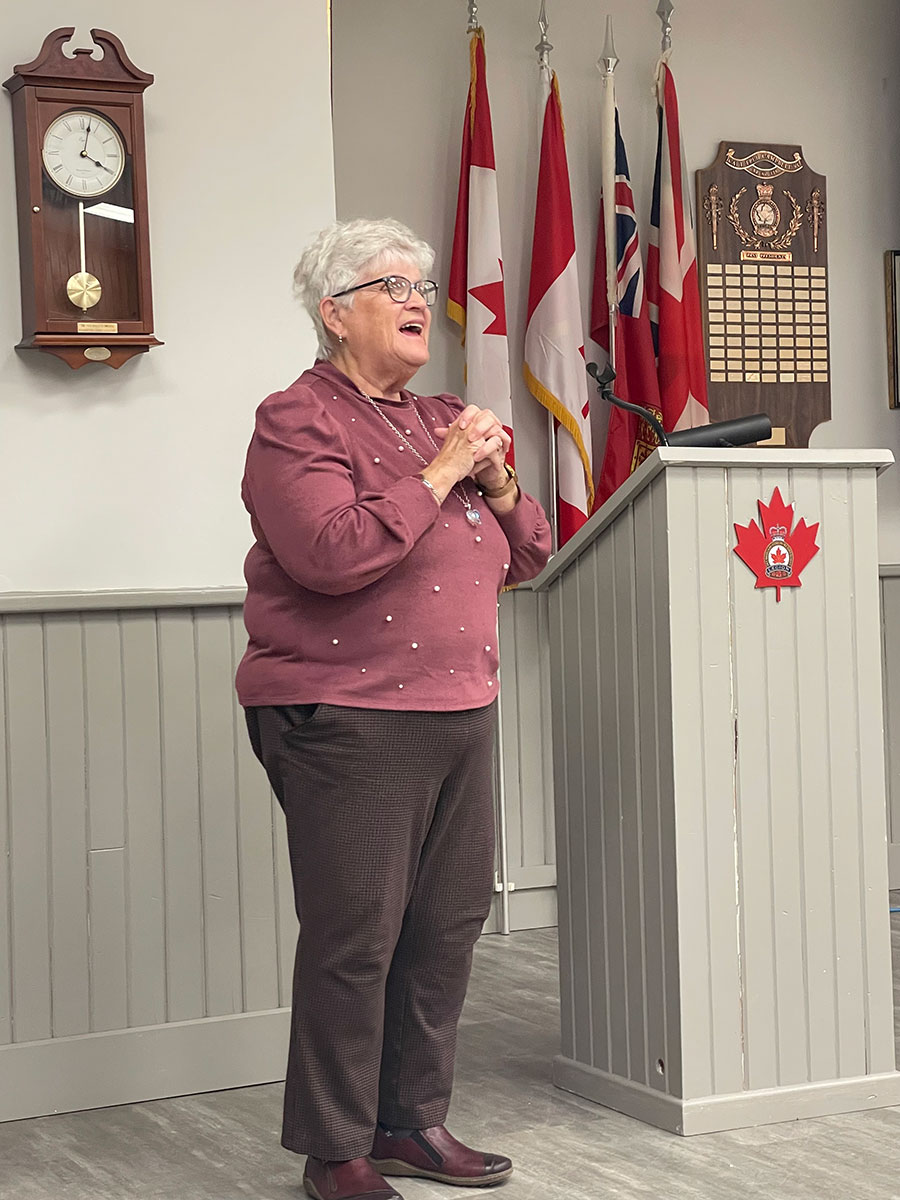MOUNT FOREST – More than 60 residents from Mount Forest and the surrounding area attended a fire safety meeting on Feb. 27 at the Royal Canadian Legion here.
Organized by volunteer Kay Ayres, the meeting covered various points of fire safety and paramedicine.
“Planning+Preparation =Safety” was the main theme for the day.
“I already had an event in December for anti-fraud and scams and I thought, well, ‘I know how to get the information out to seniors,’ so I just contacted our firemen and Helen [Edwards], and that was it. We put it together,” said Ayres, recipient of the 2022 Wellington North senior of the year award.
Edwards, program coordinator at the Seniors Centre for Excellence said Ayres “likes to look out for other people.
“She is the president of the Mount Forest Seniors Association, and she just wants to make sure that seniors are safe, whether it’s with their funds or in their home,” said Edwards.
“She’s just one of those community people that takes care of others.”
Wellington North director of fire services Chris Harrow was the first speaker of the day.
Get out fast
“Having working smoke alarms and working carbon monoxide alarms is so important nowadays,” Harrow said
“We are not going to get there fast enough to get you out of your burning house.”
Harrow noted, “It takes only three to four minutes from the time a fire starts to the time the room becomes totally engulfed in flames. We can’t get there in three to four minutes.”
More than half of all home fire deaths occur between 10pm and 6am when most people are sleeping, so it’s crucial to have an escape plan in the event of an emergency.
“Make sure your smoke alarms are working and are in the right spot because if they can detect the smoke early enough, it gives you time to get out of your house,” Harrow added.
He said escape plans should “focus on the path that you would take to get out and think about it as if it’s three o’clock in the morning.
“That nuisance fire alarm is going off and there actually is smoke in the house and you have to get out in kind of a panic state.
“What obstacles could be in your way when you’re groggy and need to get out of that house?”
The silent killer
Harrow also touched on the importance of carbon monoxide detectors in the home.
“As our houses and furnaces start to get older, if we don’t have them checked often and repaired, they can put out carbon monoxide,” he explained.
“We see probably five or six cases a year, at least, where we go in and there’s carbon monoxide in residences.
“You don’t know it’s there until that alarm lets you know it’s there. You can’t smell it. You can’t see it. You can’t taste it. That’s why they call it the silent killer.”
Batteries important
Harrow suggested everyone should test their smoke alarms once a month.
“What we recommend is to do it at the start or end of every month.,” he said.
“It becomes routine then when you rip your calendar off, you just push the buttons on your smoke alarms to test them.”
Exit – don’t extinguish
Many people are under the false impression they should always use a fire extinguisher in a house fire.
They can save lives and property if the operator know how to use them, but Harrow had other thoughts.
“Fire extinguishers are good to have but what we recommend is – don’t stop to use them. Just get out and let us take care of it,” Harrow said.
“With modern-day construction and materials that are in your house, your house will flashover quickly.”
Flashover is the near-simultaneous ignition of most of the directly exposed combustible material in an enclosed area.
Paramedicine
Wendy Bieman, commander of the community paramedic program, gave a presentation on the provincially funded free program that can benefit seniors in many ways.
It assists with understanding medications and medication review, providing liaison with Home and Community Care Support Services (HCCS), making house calls, arranging ride services, and identifying dangers in the home, to name a few services provided.
“I’m absolutely seeing it help people and it’s something that seems to make sense in our really, really strained healthcare system,” said Bieman.
She told those in attendance that if they say, ‘I’m just not feeling quite right, and I don’t know if I should call 911 or if I should go to the hospital,’ we can help you out with that.
“We’re not supposed to replace a doctor. We’re supposed to keep you safe in your home. We can assist with making the right call.”
To learn more about fire safety or the paramedicine program, visit guelph.ca or connect via email at communityparamedic@guelph.ca.




